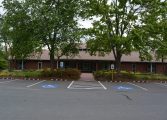By Page H. Gifford
Correspondent
Dr. John Kinney was not sure what his topic for the NAACP Prayer Breakfast would be on January 9. He’s still pondering that. But what he does know is that it will reference our current cultural divide and political turmoil.
Like many looking forward to a new decade, their hope guides them and their belief in change is strong.
“Moving forward is not looking back but we cannot deny what is behind us,” said Dr. Kinney. “Our future cannot be defined by our failures.” Wise and strong words from a theologian who has made faith a guiding force in his life as well as that of others.
Dr. Kinney’s career as a theologian; teaching, lecturing, and administrator spans 40 years and includes 27 years of service to Virginia Union University as dean of the Samuel Dewitt Proctor School of Theology and senior vice president of the university.
He received his undergraduate and graduate degrees from Marshall University and Virginia Union University and his Ph. D. from Columbia University/Union Theological Seminary (New York). He has also shared in instruction at Chicago Theology Seminary, Randolph Macon College, Union Theological Seminary, and the College of William and Mary.
Dr. Kinney has lectured extensively across the U.S. and Africa. He has been a featured lecturer at numerous universities and colleges, including Yale University, Duke University, Michigan State University, Howard University, Southern Methodist University, Virginia Commonwealth University, and the University of Richmond. His specialty is his theological constructions, addressing the designed harmony in creation and the subsequent fragmentation and separation regarding racism, sexism, and materialism. His thoughts are included in several publications, including an article titled The Theology of Fallenness: The Roots of Racism.
He has been a member of the American Society of Church History, the American Academy of Religion, and the Society for the Study of Black Religion. He has served the larger community of theological educators through multiple leadership roles in the Association of Theological Schools in the United States and Canada. Dr. Kinney chaired the Committee on Race and Ethnicity as well as served as a member on the Commission on Accrediting as commission chair, vice president, president, and personnel committee chair.
With all his academic knowledge and experience, Dr. Kinney is insightful, wise, and honest in his assessment of the current social climate and what all of us need to do to bring change in a new year. Since January is a month to recognize the accomplishments of Dr. Martin Luther King Jr., he talked about why King’s legacy is so important.
“I some ways it is a renewal and a celebration of Martin Luther King Jr. Recognizing his sacrifices and dying for a cause he believed in,” he said. “There will always be a debate or methodology about his approach to injustice. What will not be debated is his integrity and commitment.”
Whereas some viewed King in his day as a savior, Dr. Kinney believes African-Americans are headed in a different direction and not just looking for another leader.
“We’re not looking for another savior, but a collective group, representing our Christian values, calling us all to our responsibility.” Dr. Kinney doesn’t think it will be one person that certain segments of society will look up to for guidance but that they will find it within the people themselves. Nowadays, it may be groups and movements like Black Lives Matter that want that dialogue and will propel society into a new realm of understanding.
With all that has happened this year and in previous years, Dr. Kinney strongly believes that change will happen but he says this with caution. He points out that past advances have been thwarted by counter-movements.
“ I don’t say this with naivete or romantic notion but change has been retarded by certain elements and as a result, people stop believing in change,” he said. Like other experts, he agrees we need to look less at the larger picture and focus on the minutia of cause. He points out that it doesn’t start with government, in hopes they will do the right thing, but with collective groups at smaller levels. He says it starts with us, our neighborhoods, schools, and other local institutions, and organizations. In small ways, we can embrace change and take action while combating systematic racism. “We go about this as business as usual and our approach is charity without examining the fundamental issue.” He added, “Anytime a system gives us privilege we try to preserve it.”
He says he has never seen so much division.
“This kind of open vitriol and divisiveness is on a level of irrationality not rooted in reality. And it is difficult to get anyone to respond. We need to take a breath.” He suggests that in talking to one another we can discover similarities that no longer divide us but bring us together. By talking we can ask what dreams, goals, and desires we share. When we have conversations with others, he suggests being aware of what is taking place, how much energy are we expending and no progress is being made. We make the choice.
“We need to ask ourselves when did I start living in fear instead of hope? Fears are not based in reality but are constructed and connected to certain forms of oppression, color, and gender.”
He believes that with anything in life it is a matter of conditioning and being positive should be part of it. While there is a resurgence for what we thought had been laid to rest 50 years ago, Dr. Kinney believes that the conversation begins with each of us to make changes.
“Speak honestly, never surrender hope, and work on healing. We cannot be dishonest; we have to be realistic. Reality embodies the hope we have and commit to healing.”
To register for the virtual event and hear Dr. John Kinney speak, visit fluvannacountynaacp@gmail.com.




